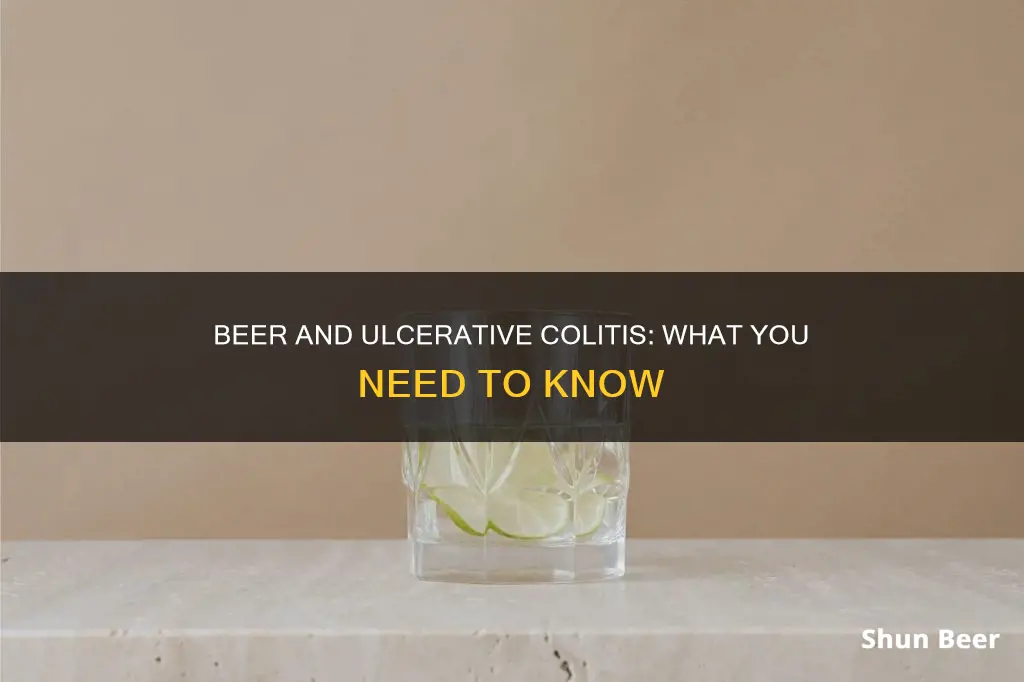
Ulcerative colitis is an inflammatory bowel disease (IBD) that can cause the lining of the large intestine and rectum to become inflamed. Alcohol is known to trigger inflammation and damage the lining of the intestines, which are the same effects as ulcerative colitis. Therefore, drinking alcohol can worsen symptoms or increase flare-ups. It can also negatively affect the gut microbiome and increase bowel permeability, which are markers of worsening ulcerative colitis. Alcohol can also interfere with ulcerative colitis medications, reducing their effectiveness or increasing side effects.
What You'll Learn

Alcohol can cause bleeding in the gut and irritate the gut lining
Alcohol can irritate the stomach and digestive system, and this irritation can extend to the gut lining. Alcohol is associated with acid reflux, or heartburn, and can cause the stomach to produce more acid than usual, which can wear away at the stomach lining and cause inflammation and pain (a condition known as gastritis). This can develop into painful stomach ulcers.
Alcohol can also cause gastrointestinal tract bleeding, which constitutes a medical emergency. Alcoholic gastritis can lead to upper gastrointestinal bleeding, which can be life-threatening if the bleeding cannot be stopped or if the stomach lining is perforated.
Alcohol can also irritate the gut lining by increasing bowel permeability, which is a marker of worsening ulcerative colitis. It can also aggravate inflammatory responses in the gut, which can make ulcerative colitis worse.
The Magic of Auto-Fill Beer Cups: How Do They Work?
You may want to see also

Alcohol can negatively impact the gut microbiome
Secondly, alcohol can affect the protective mucus layer on the intestinal lining, leading to a "leaky gut". This increases intestinal permeability, allowing pathogens and toxins to enter the bloodstream and causing a range of health issues, including liver damage.
Thirdly, alcohol can impact the enzymes in the stomach lining, overwhelming the system and leading to vomiting and diarrhea. It can also affect the immune system, decreasing the body's ability to fight off intestinal pathogens and increasing the risk of infection.
Finally, alcohol can interfere with the effectiveness of certain medications, including those prescribed for ulcerative colitis, and can increase the severity of side effects.
Overall, while the impact of alcohol on the gut microbiome is complex and not fully understood, it is clear that heavy drinking can have negative consequences for gut health and increase the risk of inflammatory issues and disease.
Drinking Beer at Texas Parks: What's Allowed?
You may want to see also

Alcohol can cause liver damage and interfere with medications
Alcohol can have severe negative effects on your body if you have ulcerative colitis. One of the biggest reasons to avoid alcohol is that it may interfere with certain medications used to treat ulcerative colitis. For instance, if you're taking metronidazole, you should avoid alcohol while using it and for at least two more days after your last dose. Alcohol consumption can also increase the likelihood of experiencing side effects from other medications.
Drinking alcohol can also lead to an increased risk of liver damage, which may be compounded by other medications that need to be processed through the liver. If you're taking certain painkillers or steroids for an ulcerative colitis flare-up, it is best to temporarily avoid alcohol. Consult with your doctor or pharmacist about the safety of consuming alcohol with your medications to prevent harmful reactions and worsening symptoms.
Alcohol can also negatively impact your gut microbiome. It can affect the protective molecules in your gut and increase bowel permeability, which are markers of worsening ulcerative colitis. Alcohol can also aggravate inflammatory responses in the gut, making ulcerative colitis worse.
Additionally, alcohol can cause bleeding in your gut if you have inflammatory bowel disease (IBD), which includes ulcerative colitis. It can irritate and inflame the gut lining, which helps keep toxins out and absorb nutrients into your bloodstream. Alcohol can also disrupt the amount, diversity, and balance of healthy bacteria in your intestines, leading to potential gut infections.
In summary, if you have ulcerative colitis, it is essential to consult with your doctor or pharmacist before consuming alcohol to understand the potential risks and how it may interfere with your medications and impact your overall health.
Heart Stents and Beer: Is It Safe?
You may want to see also

Carbonated alcoholic drinks can cause gas
If you have ulcerative colitis, you may want to avoid drinking alcohol to help manage your condition. Alcohol can negatively affect the gut microbiome and irritate and inflame its lining, which helps keep toxins out and absorb nutrients into your bloodstream. Beer, a carbonated alcoholic drink, can also make you gassy.
While it is safe to consume alcohol mixed with carbonated beverages in moderation, it's important to be aware of the potential temporary effects on your body. The carbonation can cause a faster rate of alcohol absorption, leading to feeling the effects of bubbly drinks faster compared to flat drinks. However, this doesn't mean you'll be more drunk overall, as blood alcohol levels even out over time.
Carbonated beverages, in general, tend to cause gas, which can lead to gastrointestinal symptoms such as bloating, flatulence, abdominal pain, and heartburn. These symptoms can be especially uncomfortable for those with ulcerative colitis. Therefore, it is recommended to limit the consumption of carbonated drinks and choose those that are lightly carbonated or contain no alcohol or sugar if you experience worse symptoms.
Corn Syrup in Beer: Does It Work?
You may want to see also

Alcohol is a diuretic and can worsen diarrhoea
Alcohol is a diuretic, which means it draws water out of the body and can lead to dehydration. This is particularly problematic for those with ulcerative colitis, as staying hydrated is important for managing the condition.
As a diuretic, alcohol can also worsen diarrhoea, a common symptom of ulcerative colitis. It stimulates the bowels, which can lead to an urgent need to defecate. This is especially true of carbonated alcoholic drinks like beer, which can also cause gas.
Alcohol can also cause bleeding in the gut of those with inflammatory bowel disease (IBD), which includes ulcerative colitis. It can irritate and inflame the gut lining, which is responsible for keeping toxins out of the body and absorbing nutrients into the bloodstream. This can lead to poor nutrient absorption.
Alcohol can also negatively impact the balance of healthy bacteria in the intestines, which is crucial for normal digestive functions. It can increase the risk of bacterial invasion and negatively affect protective molecules in the gut, increasing bowel permeability. This can lead to a worsening of ulcerative colitis symptoms and an increased risk of relapse.
In addition, alcohol can interfere with medications commonly used to treat ulcerative colitis, such as metronidazole, mesalamine, azathioprine, and methotrexate. It can reduce the effectiveness of these medications or increase their side effects.
Therefore, while the decision to consume alcohol is a personal one, it is generally recommended that those with ulcerative colitis avoid alcoholic beverages or limit their consumption to prevent a potential worsening of symptoms.
Beer as a Hair Conditioner: Does it Work?
You may want to see also
Frequently asked questions
Alcohol is known to trigger inflammation and irritate the digestive tract, similar to ulcerative colitis. It can also damage the lining of the intestines, which are already affected by the condition. It is generally recommended to avoid drinking alcohol if you have ulcerative colitis, as it can worsen symptoms and increase the risk of relapse.
Drinking alcohol with ulcerative colitis can lead to several negative consequences, including increased inflammation, gut permeability, and the risk of bacterial invasion. It can also affect the gut microbiome and negatively impact the protective molecules in the gut. Additionally, alcohol can interfere with ulcerative colitis medications, reducing their effectiveness or increasing side effects.
Some people with ulcerative colitis find that certain alcoholic drinks are easier to tolerate than others. Red wine, for example, has anti-inflammatory properties that may benefit inflammation management. However, it can also increase gut permeability over time, leading to more inflammation. It is generally recommended to avoid drinks containing sulfites, such as wine and beer.
The best way to determine if alcohol is triggering your symptoms is to keep track of your symptoms and what you consume. Write down everything you eat and drink before experiencing a flare-up to identify any patterns or triggers.
It is generally not recommended to combine alcohol with ulcerative colitis medications. Alcohol can interfere with the effectiveness of the medications and may worsen side effects, especially with corticosteroids. Consult your doctor or pharmacist to understand the risks and make informed decisions.







